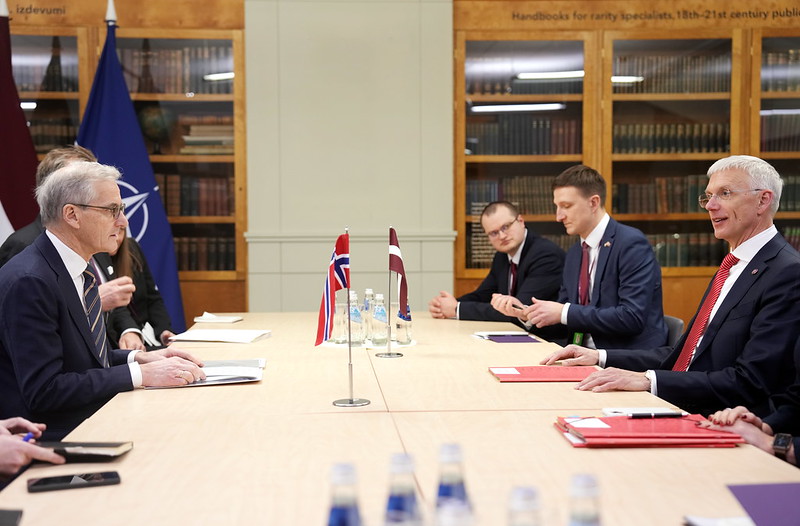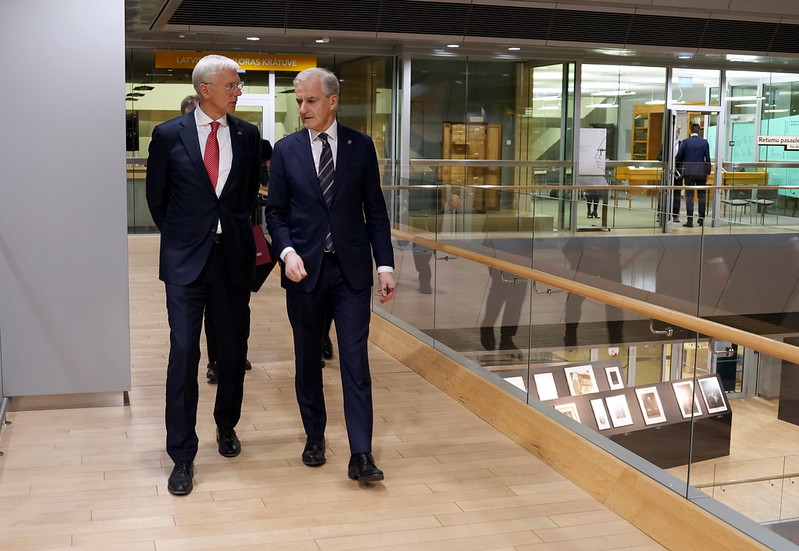Norwegian Prime Minister Jonas Gahr Støre joined leaders from the other Nordic countries, the Baltic, Great Britain and the Netherlands on Monday to discuss regional security challenges and support for Ukraine. Støre vowed once again that Norway will continue to offer “considerable amounts” for many years.

“We came with a clear message today that Norway will continue to support Ukraine (despite turning down Ukraine’s request for tariff relief on Ukrainian exports) with considerable amounts in the years to come,” Støre said after the meeting in the Latvian capital of Riga. According to a joint statement issued after the meeting, he and others attending also discussed Russian military activity in the High North (Arctic) area, the North Atlantic and the Baltic Sea, and “growing hybrid threats.”
The meeting was attended by all members of the so-called Joint Expeditionary Force (JEF), set up in cooperation with NATO in 2014 and viewed as setting the framework around close cooperation among “like-minded” countries. They in turn work with NATO in forming “flexible” regional military forces that can quickly be put into place wherever an acute defense may arise.
The Baltic region was central in discussions on Monday, as Sweden and Finland wait for their NATO membership applications to be approved. Norway, Latvia, Estonia and Lithuania already are members of NATO and eager to deepen cooperation with Sweden and Finland in an area where Russia looms large to the east and where pipelines already have been sabotaged.

JEF is viewed as a “complement” to NATO, and meant to streamline the ability of military forces in each individual country to quickly start working together in the face of any threat. Russia has emerged as the biggest threat after it invaded another neighbouring country, Ukraine, in February. It’s also been launching constant missile attacks on Ukraine lately, and on Monday came reports that it’s been flying Iranian-made “kamikaze drones” over nuclear power plants.
“We condemn Russia’s attacks on criticial national infrastructure (in Ukraine), where the goal seems to be to terrorize the people of Ukraine,” Støre said. “Attacks against the civilian population and civilian infrastructure are entirely unacceptable.”
The leaders of most all JEF governments, including the new British Prime Minister Rishi Sunak, took part in Monday’s meeting along with the Dutch and Danish defense ministers. Ukrainian President Volodymyr Zelensky also took part via video link, and expressed his “continued determination and resolve in the face of Russia’s unprovoked and illegal war,” read the JEF’s statement. “Today we committed to provide further poilitical, miitary, humanitarian and economic support to Ukraine for as long as it takes. Ukraine’s victory is vital to all our security.”

Støre called JEF “an important contribution to regional cooperation” that also boosts security and stability in all of Northern Europe. The countries involved “have common interests and values,” Støre said, and JEF can help them cooperate either in addition or together with NATO.
Støre noted that the JEF countries “deepened their cooperation at sea, on land and in the air” this year, and that cooperation will continue next year and beyond. “We also agreed to continue to cooperate on integrating Sweden and Finland into NATO,” he said.
JEF repeated its “determination to ensure full accountability” for war crimes, sought by the recent Nobel Peace Prize winners, and “support for Ukrainan refugees who have had to flee their homes.” It stated that “no peace talks can be credible while Russia continues to pursue a war of aggression. We therefore call on Russia to cease hostilities, withdraw its forces, abide by its commitments under international law and restore peace and security in Europe.”
Støre also had a bilateral meeting with Latvian Prime Minister Krisjanis Karins, at which they spoke about the importance of secure energy supply to Europe and the need to develop more renewable energy.
NewsinEnglish.no/Nina Berglund

